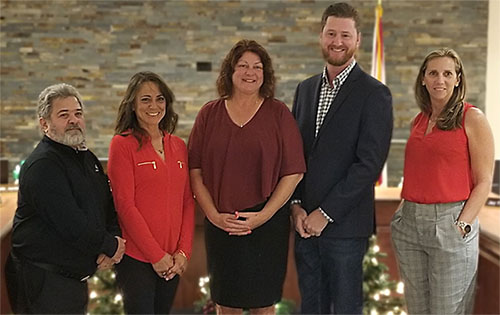
Plans for a new equestrian committee were scheduled to be trotted out and reviewed again at the Wednesday, May 17 meeting of the Indian Trail Improvement District Board of Supervisors.
The draft mission statement for what is tentatively being called the “Equestrian Trails & Infrastructure Advisory Committee” reads: “To preserve a system of equestrian trails; trail heads; signage and in-park trail systems that will provide a safe, enjoyable environment for the horse and the rider, while also providing educational opportunities and disseminating informational materials to help aid in this effort.”
According to the agenda, the committee’s objectives include: identifying and clearly distinguishing an equestrian trail system that will connect parks, impoundments and state or county preserves; recommending signage, distance markers and other notable amenities, such as watering areas and trail anchor points; creating volunteer cleanups and a maintenance schedule of the district’s trail system; attracting sponsors to pay for signs and other amenities along horse trails; and working with the district’s equestrian specialist and others to plan, coordinate and implement trail rides.
ITID Supervisor Keith Jordano said he supports the idea of a committee to promote equestrians within the district but said it needs to be streamlined, and its focus needs to be broader than trail riding.
“It’s too big,” he said of the proposed 12-person committee, which is slated to have five members, five alternates and two at-large members with equine experience drawn from area communities such as Wellington and Loxahatchee Groves. He suggested a seven-member committee with five regular members and two alternates.
“I’ve talked to several people with horses about being on the committee, but they say they don’t do trails,” Jordano said. “That makes me wonder how many people are really going to use these trails.”
Trail riding is just one of several popular equestrian disciplines, he said.
“We have barrel racing out here, hunter-jumpers, dressage. We don’t have polo, but there may be people here with polo ponies,” Jordano said. “I think we need to look at the bigger picture, at what we can do that will best benefit the overall equestrian community.”
Part of that would include improvements to ITID’s Nicole Hornstein Equestrian Park and more events there, Jordano said. He reiterated, however, that first and foremost, supervisors have to be good stewards of ITID’s limited tax dollars, noting that to develop a safe, off-road trail system such as Wellington’s would cost millions.
The district’s tax dollars have to be divided in proportion to what the residents want, he said. “They want to make sure the money is used for infrastructure and drainage, and to improve our parks,” he said.
ITID Vice President Betty Argue, who proposed the committee, could not be reached for comment.
In other business:
• The supervisors were scheduled to hear Supervisor Elizabeth Accomando present a quarterly treasurer report created by the Finance Department. The report will highlight the status of revenue and expenditure along with other information.
“It has never been done like this before,” said Accomando, who is the board’s treasurer. “On social media, I often see people saying the district doesn’t do anything… This report is going to show exactly what we’re doing.”
The board was also set to hear a presentation by Grau & Associates on the district’s annual audit for fiscal year 2022.
• Facilities, Parks & Recreation Department Director Kenny Lawrence was slated to give a report about staffing needs for the 2024 fiscal year ahead of the board’s first budget workshop on Wednesday, May 24. Lawrence has previously said that he does not have enough staff to adequately maintain and oversee Acreage Community Park, much less ITID’s other eight parks.
• The supervisors were also set to hear from local resident Shivan Rampersad, who wants to create a youth travel baseball team under his Blue Child Foundation Inc., with a potential affiliation with the Miami Marlins. The basic premise would allow the group to use Citrus Grove Park as its main baseball facility with a set schedule of usage. In return, the group would pay for upgrades to the park, such as lighting, a batting cage, a scoreboard, bleachers and a portion of the monthly utility costs.







